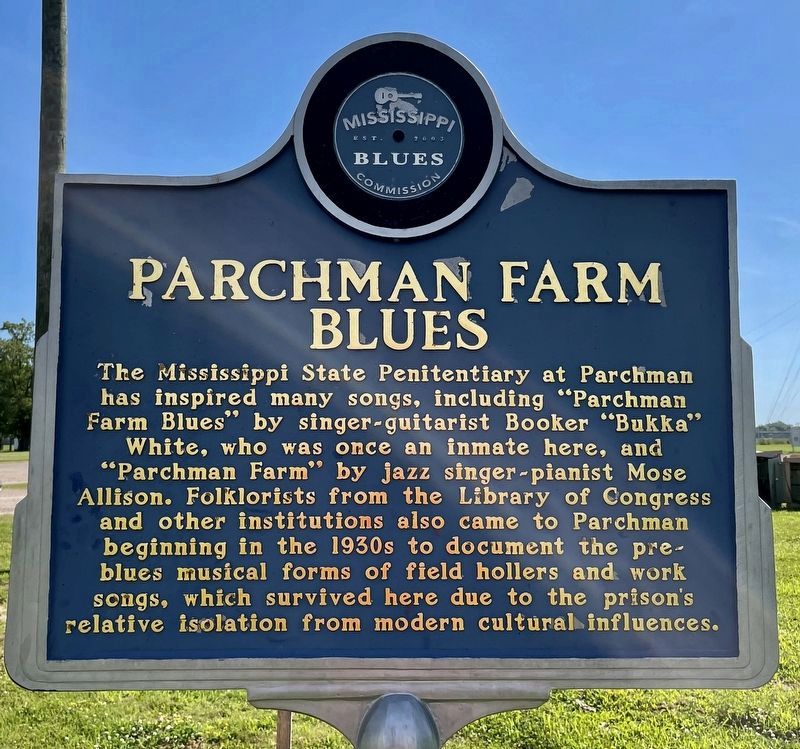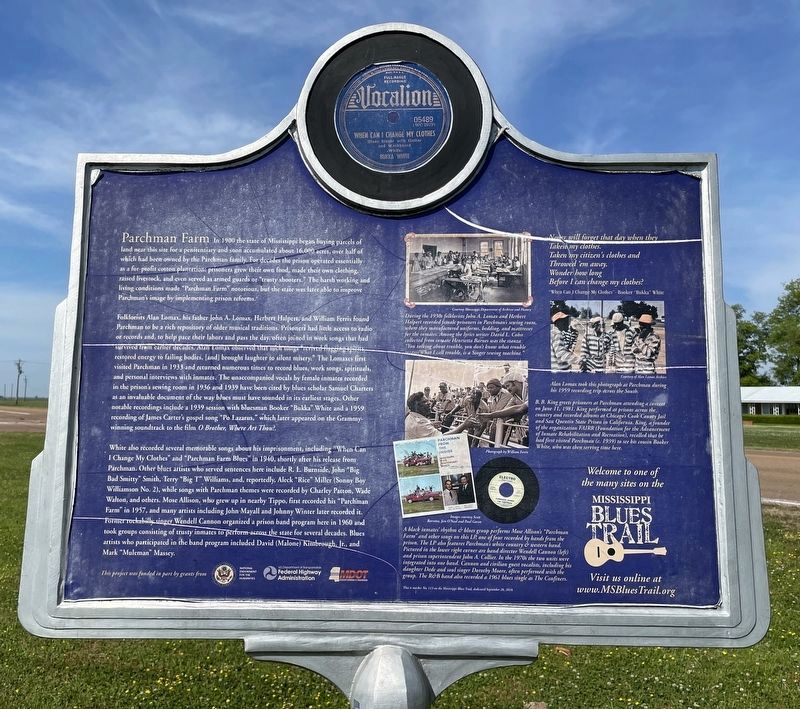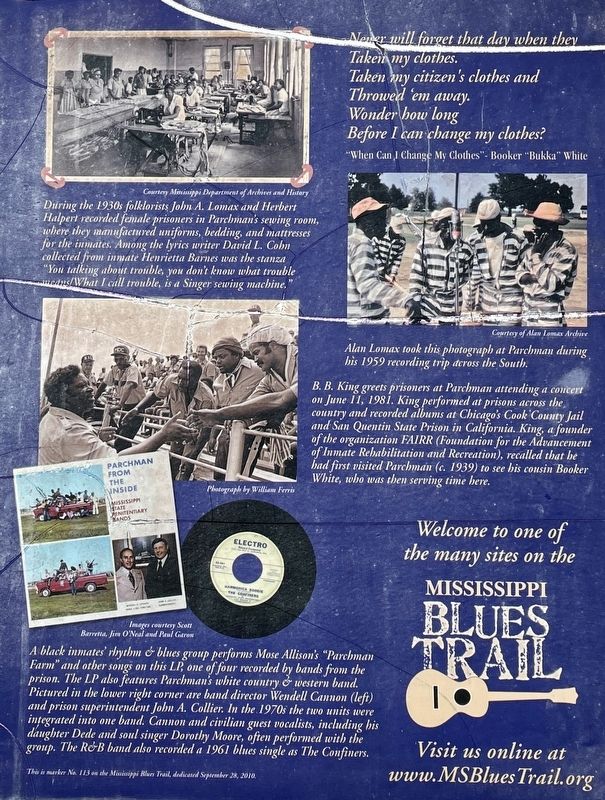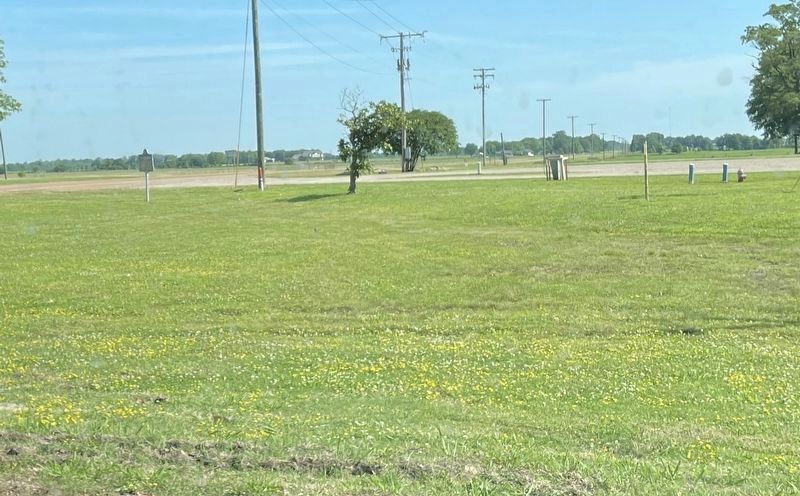Parchman Farm Blues
Parchman Farm In 1900 the state of Mississippi began buying parcels of land near this site for a penitentiary and soon accumulated about 16,000 acres, over half of which had been owned by the Parchman family. For decades the prison operated essentially as a for-profit cotton plantation; prisoners grew their own food, made their own clothing, raised livestock, and even served as armed guards or “trusty shooters.” The harsh working and living conditions made “Parchman Farm” notorious, but the state was later able to improve Parchman’s image by implementing prison reforms.
Folklorists Alan Lomax, his father John A. Lomax, Herbert Halpert, and William Ferris found Parchman to be a rich repository of older musical traditions. Prisoners had little access to radio or records and, to help pace their labors and pass the day, often joined
in work songs that had survived from earlier decades. Alan Lomax observed that such songs “revived flagging spirits, restored energy to failing bodies, [and] brought laughter to silent misery.” The Lomaxes first visited Parchman in 1933 and returned numerous times to record blues, work songs, spirituals, and personal interviews with inmates. The unaccompanied vocals by female inmates recorded in the prison’s sewing room in 1936 and 1939 have been cited by blues scholar Samuel Charters as an invaluable document of the way blues must have sounded in its earliest stages. Other notable recordings include a 1939 session with bluesman Booker “Bukka” White and a 1959 recording of James Carter’s gospel song “Po Lazarus,” which later appeared on the Grammy-winning soundtrack to the film O Brother, Where Art Thou?White also recorded several memorable songs about his imprisonment, including “When Can I Change My Clothes” and “Parchman Farm Blues” in 1940, shortly after his release from Parchman. Other blues artists who served sentences here include R. L. Burnside, John “Big Bad Smitty” Smith, Terry “Big T” Williams, and, reportedly, Aleck “Rice” Miller (Sonny Boy Williamson No. 2), while songs with Parchman themes were recorded by Charley Patton, Wade Walton, and others. Mose Allison, who grew up in nearby Tippo, first recorded his “Parchman Farm” in 1957, and many artists
including John Mayall and Johnny Winter later recorded it. Former rockabilly singer Wendell Cannon organized a prison band program here in 1960 and took groups consisting of trusty inmates to perform across the state for several decades. Blues artists who participated in the band program included David (Malone) Kimbrough, Jr., and Mark “Muleman” Massey.Erected 2010 by the Mississippi Blues Commission. (Marker Number 113.)
Topics and series. This historical marker is listed in these topic lists: Agriculture • Arts, Letters, Music • Entertainment. In addition, it is included in the Mississippi Blues Trail series list. A significant historical year for this entry is 1900.
Location. 33° 55.119′ N, 90° 29.809′ W. Marker is in Parchman, Mississippi, in Sunflower County. Marker is at the intersection of U.S. 49W and State Route 32, on the right when traveling north on U.S. 49W. Touch for map. Marker is in this post office area: Parchman MS 38738, United States of America. Touch for directions.
Other nearby markers. At least 8 other markers are within 9 miles of this marker, measured as the crow flies. W.C. Handy Encounters the Blues (approx. 7.6 miles away); Legendary Home of the Blues (approx. 7.6 miles away); Tutwiler Funeral Home (approx. 7.6 miles away); The Staple Singers (approx. 7.7 miles away); Drew, Mississippi (approx. 7.7 miles away); Tallahatchie County (approx. 8 miles away); Emmett Till Murder Trial (approx. 8.1 miles away); Tallahatchie County Confederate Monument (approx. 8.2 miles away).
Also see . . . Wikipedia article on the Mississippi State Penitentiary at Parchman Farms. Marker is located across street from Penitentiary entrance. (Submitted on May 28, 2021, by Mark Hilton of Montgomery, Alabama.)
Additional commentary.
1. Warning!
The roads around the Penitentiary are marked "NO TRESPASSING" and "NO STOPPING". The guards yelled "No Photographing"!
Credits. This page was last revised on May 28, 2021. It was originally submitted on May 28, 2021, by Mark Hilton of Montgomery, Alabama. This page has been viewed 232 times since then and 30 times this year. Photos: 1, 2, 3, 4. submitted on May 28, 2021, by Mark Hilton of Montgomery, Alabama.



